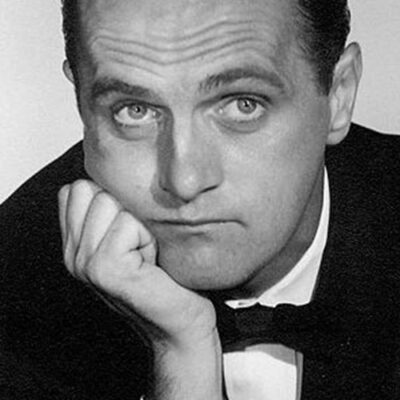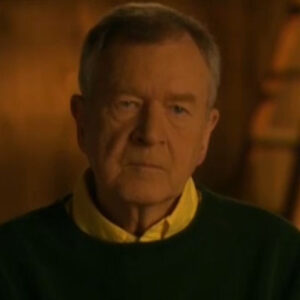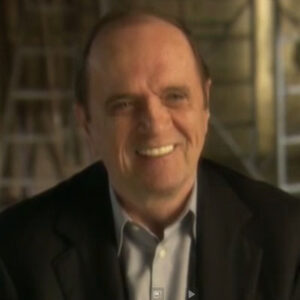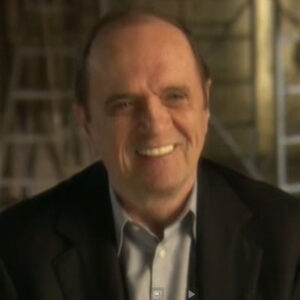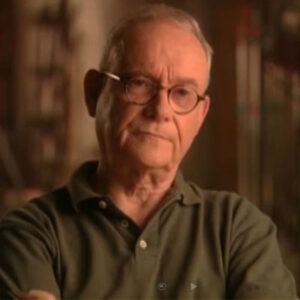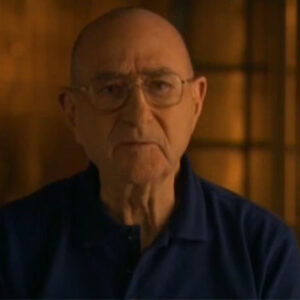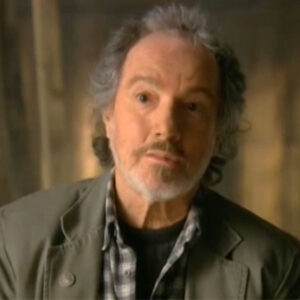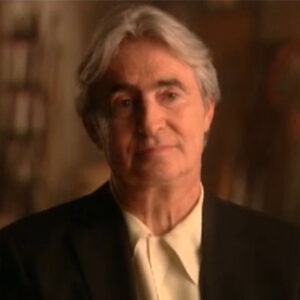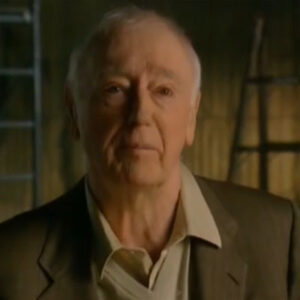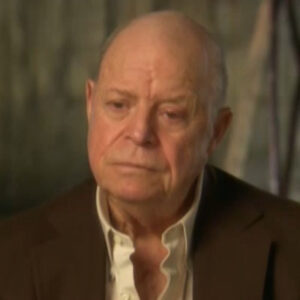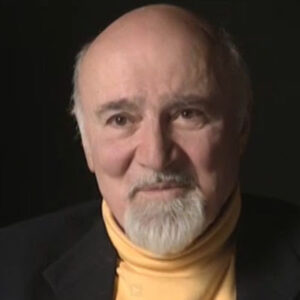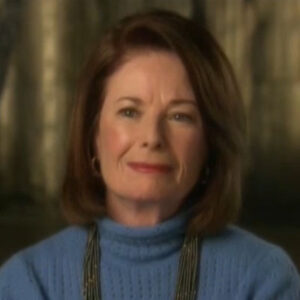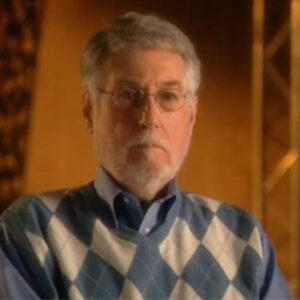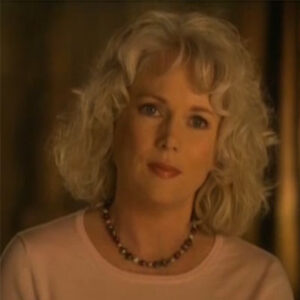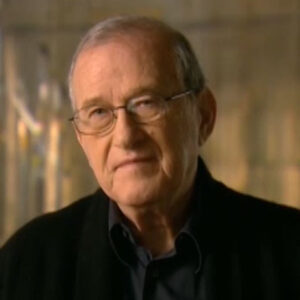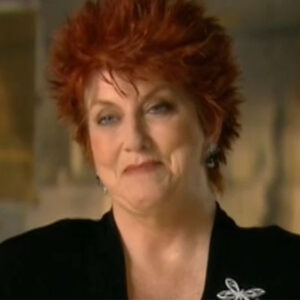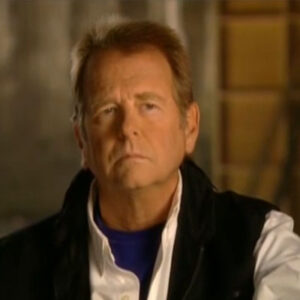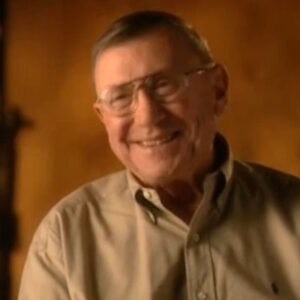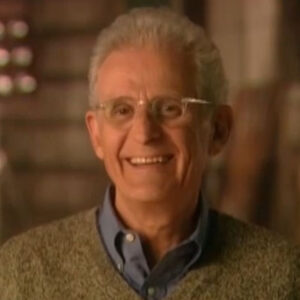Interviewer: When the scene was like in the early 50s, they started changing.
Lawrence Epstein: Right after World War Two. Comedy still was filled with one liners. Henny Youngman is just told rapid fire jokes. If you didn’t like one job. Don’t go any place because another one was coming along right away. These were meant to just get people laughing. They were very light. They weren’t serious. They weren’t about what was going on in society. And people slowly began to change. Society itself had changed considerably after World War Two. The young men returning from the army wanted to build suburban paradises. And so they they took their families out of cities. And the the two point one children they had in these lovely tract houses turned out to be less pliant than they thought they would. The women who were there found that they were living in velvet prisons and people just didn’t really feel comfortable. And they they were so driven to succeed. They weren’t they were afraid of going back to where they had come from. And they they escaped from the gray flannel co-workers and they wanted to live. Well, they didn’t have a way of escape. They they needed one. And the jokes, the quick jokes didn’t work so well. So they needed somebody to give them a way to laugh at the pain they were going through.
Interviewer: So there was more going on.
Lawrence Epstein: Absolutely. Even Ozzie and Harriet had a rock and roll son. The the underneath subterranean 50s with a beat generation. And all this was reflected not only in the swiveling hips of Elvis Presley, but in comedy as well. You saw comedians who were stretching the boundaries of language like Lenny Bruce, stretching the boundaries of what you can talk about, like a more social stretching, stretching the boundaries of what counted as comedy like Shelley Berman. There was a world in which finally people were allowed to speak someplace. Somebody was talking for these pent up emotions that that had been kept inside jokes. It became less jokes and much more psychological, almost a way of focusing on the self that they were. The jokes were escapist and worked well if you were generally happy. But if you were increasingly unhappy with the society that you found yourself in, if you increasingly thought your individuality was being lost, that that your identity was being swallowed up by the culture, then you couldn’t just sit around and laugh. You needed people to explain this to you and to give you a way to let that feeling out and out in a healthy way. You had to keep working. You had to keep raising your family. But you needed to let out that pent up anger and and great feeling being just lost.
Interviewer: And how did Bon Newhart fit into this?
Lawrence Epstein: Bob Newhart came along. I see a new heart as sort of a transition figure. He’s always almost always packaged in with with the soils and the Burmans and the Bruces. I really think that he’s sort of bent way between them and people who came just a couple of years later, the Smothers Brothers, Bill Cosby, the sort of softer comedians and knew I had this edge to him, the satiric edge that that was the foot in in the first camp. And he had the sweetness and softness, and that was the foot in the second camp. So he was able to devise a way to take the toughness from the first group. But but packaging in a way that everyone felt very comfortable and very warm and very endearing. And that, I think, was the secret to his continuing success.
Interviewer: We’ll talk more about this new wave of comedy in a minute. Let’s go back into Bob’s story at the beginning of it. Tell me when he was born and where he grew up and how that.
Lawrence Epstein: Bob Newhart was born on September 5th, 1929, to a predominantly Irish Catholic family in Chicago. And all of that is important to understand him. He was a child of the depression, which means he grew up listening to Radio Cobb. You can see in his humor. You can see Fred out. But predominantly you can see Jack Benny all through his humor. He’s he’s in fact, I think his generation’s Jack Benny. He captured a lot of the the brilliance and the method of performing. That was in Benny. And all this came from radio. The the religious background provided the stability. It provided a value system, as did the Midwestern ethos. You can’t really understand Newhart without knowing. He comes from the Midwest. All that that sweetness, that willingness to listen well is all is a very Midwestern trait, or it’s especially his business.
Interviewer: Is there a Chicago brand of humor?
Lawrence Epstein: There is a Chicago brand of humor. A second city started there. Berman came from there. Shecky Greene came from there. Nichols and May came from there. This was a hotbed and I think not accidentally. It was a hotbed of part of the reason I think Chicago was so productive is that comedy needed to speak to large numbers of people. And I think people who grew up in Chicago remember, Jack Benny had grown up in Illinois. Two people who grew up in Chicago had an ear for what everyone was interested in. They weren’t they weren’t listening only to one coast or another. They had Americans here and especially as television would emerge. You needed to speak not to one million people. You need to speak to 40 million people. So you needed to have this sense what was on the average mind? Well, what were ordinary people thinking? And if you were living on one very trendy town and one city, you had less of an opportunity to have been brought up listening and hearing that.
Interviewer: So for someone growing up. Yeah, just explain a little bit why Bob’s influence is at that time would have come more from radio and.
Lawrence Epstein: Sure. He probably wouldn’t have been able to afford going to the nightclubs to see them. And he as a child, you certainly don’t go to nightclubs as a child you’re interested in. And for some reason, as many comedians, you listen and you hear the jokes and you hear people laughing. And there’s something in the relationship between the joke teller and the audience laughing that you find endlessly fascinating and seductive. And you and comedians at one point say to themselves, I’d like to do that. I can do that. I can imagine the young boy in Chicago huddled around the radio listening to Jack Benny, being made fun of by all the wacky people around him and young Bob Newhart, which was already very clever. Mind saying, I found somebody who understands me. Isn’t the Newhart character always in search of people who understand? And I bet he found that in listening to Jack Benny, somebody who got him and somebody whom he could get. So Newhart, I think listening to Benny, listening to Fred Allen, who was not a sort of dry comedian. There are certain people. Bob Benchley was another kind of comedian. He would be attracted to. There’s a certain style that was very congenial to what emerged as as the Bob Newhart brand. And this was all formed by by the comedians he heard when he was very young. And that that would be predominantly these these famous ones on radio as opposed to on the stage. Absolutely.
Interviewer: He first started out pursuing somebody.
Lawrence Epstein: That’s right. Bob started. He had it left law school. He served in the army where he he worked shuffling papers that had a very happy job for him. And he was. Was working sort of doing accounting work, work for an unemployment office. He had a variety of different, unappealing, unsatisfactory jobs. And to relieve the boredom, he hooked up with a guy he admitted to. And I had a playhouse and they had met in Oak Park, Illinois, a suburb of Chicago. And they they found themselves friendly. The guy’s name was a Galaga. And Bob and Ed would call each other. They became a comedy team. And they said as they were going back and forth on the phone. This is good stuff. We should tape it. And they they tape that. They tried to syndicate it in one place. They got a promise of 10 stations and then three other places. The 10 station part fell through. There was money syndicating it to the three stations. So they they figured out quickly were probably shouldn’t be doing this for too much longer. But but Gallagher knew a very important disc jockey in Chicago named Dan Sorkin and Gallagher, who I think this is a fair statement not to demean either one, but but Gallagher was really a listener. He he did not swap jokes for joke, a line for line. It really was Newhart material. Gallagher was a straight man, very straight, helped them along. But the material was pure. Newhart. So if you if you heard this, you really were listening to Bob Newhart stuff. Gallagher ended up moving to New York. And there was Bob Newhart. Now a comedy team without a partner. So I suspect in his own mind he looked for a way to have a partner and a telephone came. It came about. The telephone became his partner. And the team was was born again. So.
Interviewer: Can you talk about the telephone as a prop?
Speaker OK. OK. Bob, in fact, was not the first person to use the telephone as a prop. It really had begun in vaudeville with a whole series of routines called code on the telephone. It became famous in vaudeville, actually, with a comedian named George Jessel, who used to make these very hilarious calls to his mother and that they became famous in show business. You have to skip some generations to the fame. Shelley Berman did it. And his were very, very, very funny bits that he did. Nicholson made the telephone, but they had two people in the conversation. So. So Newhart didn’t originate the idea of using a telephone. What he did that was different. That was was unique. And typically, his aren’t typically his own was not to use it for him to talk about only contemporary contemporary people. He he relied on historical figures. So so we start out first famous. This is him as a press agent talking to Abe Lincoln. There’s one on another album. He has somebody in the East India Company talking to Sir Walter Raleigh, who’s trying to convince him that tobacco can really sell. And the guy is sure from the description, that account that there’s another one about Ben Franklin and so on and so forth that hit his method of using the telephone while it had its roots. And comedy was also completely new and completely different in how he use it. He unintentionally or realistically developed the stammer, and that became a characteristic for his career. The stammer was very useful on the telephone because it gave an audience a chance to participate. They would they would sort of invent what the person on the other line was saying. And in that stammering they have a time to absorb it so they could get ready for his response. This was an extremely brilliant comedic move because it made the audience part of the act. They felt very connected as opposed to sort of being a target of the machine gun attack of jokes. They were now taking part in the act itself. So the new heart had this this brilliant technique of using a telephone. And it’s not just a guy standing there talking into a phone. He had really thought it through and figure out how to use it to express purpose.
Interviewer: He was creating a mental picture for us.
Lawrence Epstein: That’s right. He was creating mental pictures. He wanted us to see it. Which is one of the reasons he didn’t work particularly well all the time, where he felt uncomfortable working in nightclubs, in nightclubs. You get not to be impolite, but drunks, you get people not paying attention. You get people talking to their dates. Newhart needed his material was so good that it needed the attention you needed to take point in it. You couldn’t do something else while you were listening to Newhart. And that’s why he worked so brilliantly on records where he worked. So ultimately went to one of the greatest television comedians of all time, of course. And that’s the reason that that you could feel like you were part of it. You could enter into his world.
Interviewer: So Dan’s working.
Lawrence Epstein: Dan Sorkin got a hold of the tapes and he was floored. He listened to Newhart. Now, Dan Sorkin was a very important teacher. This is not just some guys spinning discs. He was a very important guy who knew a lot of people and he realized that Bob Newhart was as good as anybody else on the national scene. That was a representative from Warner Brothers Records who who distributed the records in Chicago. Now, Warner Brothers records at the time was practically bankrupt. They had no money. And Sorkin said to this distributor, look, I’ve got the funniest guy you’ve ever seen. This guy is brilliant. The distributor. Sure, right. Like, he’s heard this 10000 times. OK. Let’s hear it. He plays the stuff. It is brilliant. He calls a couple of Warner Brothers exacts who are about to fly off. They know they have no time for this, but he convinces them just here. So they go to the Warner Brothers warehouse, which is right near the airport. And and the executives listen to three bits that the Newhart has done. And they are completely. We’ve got to sign them up. Often it takes a while. You listen to comedian judge, you say that’s not bad. We need to polish this material. What can you do with Newhart? He was so smart and such a good writer that the material came polished. It didn’t need to be reworked.
Interviewer: So we’ve before we move more into the albums. Asked you there was a period to when before that that when you met Dan Sorkin and Dan involved in. Some bits on his radio show and think very short lived tv show.
Lawrence Epstein: Dan Sorkin wanted to help Bob Newhart. He he saw a talent and he wanted to help it out. So he invited Bob to be on his radio show and that he invited him to be on a on a very short lived. Two weeks worth of short lived a television show. And Bob would be somebody who pretended to be in the audience and would and would interrupt. This was all. And this was all tremendous stuff. And. And Sorkin said, I’ve got to do more with this guy.
Interviewer: But what about that? Was it it? Was it a way for five to. Honed his material in a way that.
Lawrence Epstein: Newhart learned from doing this, but the work was sporadic. The pay was even more sporadic. And he he needed to find a way to make a living. He wasn’t getting a lot of time when you’re a young comedian. If you’re if you’re in a nightclub with those comedians that grew up working, the Catskills had to work all the time, all day, and his work was too sporadic to get that training. So he tried his best to get every job he possibly could. At one point, he said, look. Maybe I can write. I’m a good writer, so he he went to an unnamed famous comedian and said, look at this stuff. The comedian looked it over and said, sorry, I can’t use it. Show me some other stuff. Then a few weeks later, that comedian used the stuff on Steve Allen’s television show. And Newhart saw it and said, look. If somebody is going to steal my material anyway, then I might as well perform it myself as stealing is a time honored tradition, of course, and in many fields of life, comedy is not exempt from that. And Milton Berle made a career not only of stealing jokes, but of joking about stealing jokes. So. So new heart. No, he didn’t just want to provide jokes to somebody else. Woody Allen came to this conclusion to that debt ceiling was not enough. It was the warmth of the audience that touched that really was important. It takes a certain drive. A modest person like Bob Newhart probably wouldn’t talk about this himself. But I think it’s important to understand in a comedian with that talent and that success, that there is some powerful undercurrent, some drive that’s so deep and and so powerful that it takes them through what I think most people would would say are extremely difficult times. And most people would stop. We’re not talking about somebody here who’s 20 years old. Above, Newhart is in his 30s here. I was 30 when when the first album comes out. So. He really has put in some time without success. And he still has the hunger. A lot of people who were 30 years old would have said I gave it a shot. It’s time for me to quit. And I have to understand, Bob Newhart, you have to understand that, right?
Interviewer: And you mentioned before to some of the jobs he took to support himself. And was that also can you talk a little about to how? He was looking for. He was using his eyes and his ears and some of.
Lawrence Epstein: The menial jobs were actually quite important. What they did was provide comedic food in the form of anger. He worked in an unemployment office and he saw the people getting unemployment were getting five dollars a week less than he was getting behind the desk there. So he said, I’m working five dollars a week. And he also had to fill out a lot of papers while he was in the army getting G.I. loans. Stuff like this. And he he suddenly realized how deeply he hated the bureaucracy of bureaucracy, of modern life, the bureaucracy, a man and like, overwhelmed him. And I think this is where a comedian is most crucial. He took the temperature of the time. The reactions in his mind were going on in other people’s minds. But he was smart enough to develop a comedic way to deal with in a comedic way to understand it. To translate it. And to translate that anger into an outlet. And the and the the the anger came out in the form of words. So it’s odd to say, but without the a trivial jobs, without the menial, painful jobs he probably wanted developed into the Bob Newhart. We know he has one routine. He jokes that as an accountant, he figured if he got within two or three dollars, that was close enough. And this this is this is a good for a comedy routine. It’s pretty bad for an accountant. So he really needed to get away from those jobs. It must have been. Must’ve been very difficult for him because all his college friends were married. They were having children. They were in stable jobs. And here was Bob, the loser. Thirty years old. Haven’t accomplished anything. There must have been an enormous temptation to surrender the dream and lead a, quote, ordinary life. And I think that that drive, fueled by what he saw in society, is what made him develop.
Interviewer: So would you say I mean, a lot of people say. But is there more there? Is that part of.
Lawrence Epstein: Bob is very mild mannered and the pain that fueled some earlier comedians, the pain of social injustices, the pain of what kind of language you are allowed to use on stage, the pain of emotional angst. That’s not what drove Bob Newhart. What drove him was the loss of the person in society. What drove him was the sense that he, himself and therefore others was just being swallowed up, that he was becoming an organization man, that he was becoming a status seeker. These are these are names of books that were popular at the time. And they describe large numbers of people who whose individuality had been painted over by the requirements of the society. And he wanted to rebelled against that. So there was a deep rebellion in him. And it’s important to see that he’s not just a nice guy. The crucial thing is he’s a nice guy in pain. And the nice guy in pain has to find a way out. Like a lot of other nice guys in pain who watch them or listen to him, and they knew the way out that the in a way, Jack Benny had given audiences emotional permission during the Great Depression to be very cheap to to withhold money when they wanted to spend it on their children and to feel all right about themselves, to even to laugh about it. Bob Newhart gave emotional permission to his generation to to feel like they were being overwhelmed by society and figure out ways to laugh about it, to feel like they were surrounded by odd people. But they were normal. And when you listen to Newhart being this the only sane man around you weren’t. Yup, that’s how I feel. And Newhart gave you that permission to feel like that took to that. You think, you know, you’re not crazy. You’re just fine. And that was very important because the anonymity of the age could corrode a lot of souls. Bob Newhart gave people the ability to keep their souls.
Interviewer: Let’s talk about the albums too. He if he was not the first to have a comedy album but what was unique about his?
Lawrence Epstein: No hearts uniqueness in his first album was The Softness. Shelley Berman had had sold a lot of copies and been very successful. Even more so he would really started the comedy record boom of the late 50s had sold like these were brilliant, brilliant comedians. They focused on their own interests. Berman’s brilliance, for example, was talking about emotional, emotional problems. He talked about psychologists and psychiatrists and and deep angst and in himself and in the society. And he was he was brave in presenting that to the public. This was not new heights personality. He wanted to find a way not just to talk about. Himself or about social issues or about psychological issues. And he looked for what did we have in common. That he could talk about? Keeping in mind this notion of of trying to attack the system, the bureaucratic system that was relentless. And he he he he made a marriage. He he made a marriage between the representatives of contemporary society who was so damaging to individual existence. But he did show them just to their peers. He went back into history. So he starts out saying, let’s talk about public relations. These people try to control us. All right. But I don’t want to make a comedy routine about somebody trying to control us. Now, let’s see, who can this control be over? Abe Lincoln. What a brilliant, brilliant conception. Who else could have come up with that? Absolutely nobody. So this isn’t an utterly brilliant routine with a press agent is is talking to Lincoln and Lincoln wants to shave off his beard. And the press agent wants him to read the Gettysburg Address just as Charlie wrote it. He doesn’t want Lincoln coming up with some alternatives. The stuff was so original, so striking, so bold. And it was that it was the softening in a way everybody can understand it. It was an attack on a society without attacking the society. There was an aesthetic distance, and so so he he hit his targets hard. But they didn’t even realize it.
Interviewer: And to you, everything was it was also a launching point for him when he perfromed at a Emmy show?
Lawrence Epstein: That’s right. He had performed at a local Emmy show in Chicago. Bill Daley, who later performed with him, was actually the assistant director at that station. And on the Emmy show, he performed the the Abe Lincoln Bit. And it drew tremendous response in and around Chicago. Absolutely incredible response. And that was that was part of the recognition that this was a guy who wasn’t just funny with his friends. He wasn’t just funny at parties. This is a guy who could reach out to audiences. Now, ironically, Bob Newhart had never played a nightclub. This is where all the comedians were growing up. This is where they were performing. And Newhart, who had done this, this brief television, did so. We’ve done a lot of radio who had who had been on stage somewhat. Had never performed stand up in a nightclub. And and so this actually created a little problem because when the Warner Brothers people. Heard the stuff and they said, oh, this is this is brilliant, we want to record you. Someone at Warner Brothers said, well, let’s just do it in front of a live audience. You’ll get the reaction, you’ll get the laughter to lend to it. And by nowhere, I haven’t performed in a nightclub. So they they went out looking for a nightclub and they had trouble finding it. People said that they turned out to be stupid. People say, well, we don’t know. And so they had to go to Houston, Texas, to a nightclub called the Tidelands, which his manager found. No heart went down there for a couple of weeks and then they recorded it live over two days, the first day was was he was he was kind of standardly very nervous. It hadn’t been for an audience before the second day. Much more relaxed, really. Most of the first album is the second day. The audience feels it, the album carefully. The audience is very small. And a must have been painful. So he’s standing there. Never haven’t performed in front of a live audience in a nightclub with a small audience. In Houston, Texas, not necessarily attuned to the humor that he knew played well in Chicago. But but happily, which did so, it was an extraordinarily difficult circumstance, compounded by the fact that he perceived quite correctly, his entire career was on the line. Who would want to be in such a situation? And yet, when you listen to the album is it’s just today it remains strikingly fresh.
Interviewer: You can say when that album came out. So just. Again, to say that how unusual it was to go from nothing to success overnight,.
Lawrence Epstein: That’s right. Bob Newhart first opened the button down mind, Bob Newhart was released in April 1960 and literally overnight. Bob Newhart was this famous guy. They would play record. The record was played. In various radio stations around the country, so in a place like San Francisco, this cut became popular, another city that became public. But throughout the country, the way this stuff works is word of mouth. People hear it on the radio. They think it’s hilarious. They say, I want to hear that. And the key about Newhart is he’s so comfortable. The voice was so comfortable. You wanted to hear it again. You got the voice. Invited you to listen to some more. So there was Bob Newhart. A couple of years before working in an unemployment office. And now he’s suddenly this extraordinarily famous national comedian. Having worked in one nightclub, this this was not your typical road to success among American performers. And it must have been very difficult for him. It must have been difficult all around, just fielding the media reactions. A person who is different from Bob Newhart might have reacted differently and let the fame go to his head. I think there’s an old saying among comedians that you don’t change. But the people around you change. I think he was such a good person that he allowed the people around him to stay the same and he stayed the same to them, even though this fame was was enormous later in 1960, the same year his second album was released. Indeed, that the first album and the second album when NUM number one and two on the Billboard charts. And and they retained the record for the longest number of weeks, being one and two for 30 years until the record was broken by Guns N Roses. You don’t often think of Bob Newhart and Axl Rose and in the same breath, but in this case they belong together in history.
Interviewer: And how would you say those two albums in particular impacted? The field of comedy, because it changed the way comedy.
Lawrence Epstein: They try to do two albums, broaden the reception of comedy records. They the records were important. But they they altered the way comedy was heard in the country. Company was transforming itself. In fact, the whole culture was transforming. But the comedic element of the social transformation. Was more of a focus on individual need, less of that joke, joke, joke. And more of what am I doing here? What’s going on around me? And as that transformation occurred in the society, there was a need for comedy to do well. You know, during the Great Depression and World War Two, we had to surrender ourself because we needed to give the self up to a communal purpose. We haven’t got over the depression. We had to fight a war once World War Two ended. We had, as a society, spent so many years giving up ourself that we needed to reclaim it. And the comedians were part of that wave that of the American selves looking to. To be alive again, to be let out of the prison of history. So.
Interviewer: And they were listening to them in the privacy of their home as opposed to
Lawrence Epstein: That’s right. So you have so. So simultaneously, you did have you did have radio which came into the home, but now records and then television, you had the home became the real center of entertainment and you needed to invite people whom you liked, who needed to invite somebody who you’d feel comfortable with. And and Newhart was was one of those people. He. He did a remarkable job with those two albums, and he became the hottest junk comedian in the country. He was just famous. The routines on both of those albums played today are still funny. And the reasons are that he did not tie them to the moment, just as he would later do on his television show. This is a this is a comedic tactic. Pete. He did not pick material that would age by next week, but that’s one of the reasons he went looking at to history. Bob Newhart material would stay fresh because it wasn’t time for a particular event. Because of that, you play that material today. It’s funny.
Interviewer: And how many albums did he have over how many years?
Lawrence Epstein: Bob Newhart ultimately had seven comedy albums from the 1960 to 1967, and the arc of his career is sort of identical to the arc of the comedy record career. You can see in him and see how he changed and what he wanted to do, the way comedy itself was changing and the forms in which comedy was received by the culture so that the comedy record was becoming less popular and television was becoming more popular. So that most of the comedians had to make that transition very difficult when the comedy record, people didn’t need to see if they could just listen to your voice. They could they could let Baz over them. But with television, you had to appear a certain way. You give voice how to be a certain way. It was very difficult. A lot of radio comedians really dislike television. Edwin calls it the glass furnace because they used a burned up material each week. So incredibly fresh all the time. Benny and Burns, Jack Benny and George Burns used to say they they like radio a lot better because the imagination could be a work. It was very difficult to be a television performer and everybody would have to learn. Nobody got this right away.
Interviewer: So explain that, if you would because of the success of those albums it led to him being offered.
Lawrence Epstein: Newhart was such a hot young property that all three networks said, let’s get a new TV show. He has TV coming along. NBC won because NBC said, we’ll let you do what we what you want to do. And it’s important for a comedian to have that kind of control. So Newhart signed up. He did the Bob Newhart Variety Show in in 1961. And it’s very clever. It’s very smart. But it went to a couple of very serious problems. First of all, Bob and the producer ultimately began arguing about what’s funny. The producer had a long history in the business and he knew what’s funny. He didn’t know necessarily what was funny for Newhart. No, Hart, who had been writing for much less time, knew what was Newhart material. So that was an understandable professional conflict also. Bob Newhart wanted Dan Sorkin, the announcer who had discovered him to be the on air announcer for his national television show. NBC didn’t think Dan Sorkin looked extraordinarily comfortable on the air. They want him to replace him. You said no. So I think it’s important. This is not accidental. It is. And it’s even beyond loyalty, which is wonderful itself. It illustrates Newport’s generosity of spirit. It illustrates the man behind the comedian. And I don’t think you can understand the comedian without understanding what I was going. What a good man he is. And this standing by, Dan Sorkin. When others wanted to send them overboard, it’s very typical. The show was was quite clever. I’m not sure that that variety show was the right vehicle for Bob Newhart. First of all, variety shows as a form were declining in popularity. In fact, they had been declining for maybe two years. So putting him in in a variety show was not necessarily the smartest move because the form itself was losing interest among viewers. In addition, Bob’s strength really is is performed by himself. It wasn’t so much in that ensemble. And he would later develop a way to doing again, adapting from Jack Benny. But in that variety show format, you couldn’t do it. And it it didn’t work extraordinarily well. The stuff is brilliant. He’s brilliant. He the show won an Emmy with which sadly and unfairly, his later shows did not and won a Peabody Award, both of which were awarded after the show was canceled. Which one of those? Easy. Oh, thanks a lot. I appreciate this award. But and even today, when you watch the shows, they hold up very well. And I think Sorkin is better than than NBC thought he is. He seems perfectly good. He got a wonderful voice. I just didn’t it didn’t work out.
Interviewer: What do you think, we talk about his strength in the monologues versus the sketches. If you can talk a little bit more about that.
Lawrence Epstein: In the monologues, he was very comfortable with the form he had written them himself. He was so good. One of the new right characteristics that makes him such a great comedian is his fearless use of silence and his great ability to use it well. Very rare. You can do that with monologues when when you’re in a situation or a variety show where you’re playing with others. You have to rely on their ability to do the timing. You have to rely on the characters that are not characters you’re comfortable with. So he would he would alter his voice some time or his look and. Bob Newhart look good in a button down shirt and tie and sports jacket. He’ll look less good in a Tarzan outfit. Which is he wore once on that first show. And he he seemed. Funny and simultaneously out of place.
Interviewer: So what was it, though? It did win an Emmy. What is it about that show that was obviously great?
Lawrence Epstein: I think the greatness of the show is twofold. One, the writing was excellent. I think it’s new hearts. Delivery. And winning personality, even then, it’s very clear this is a warm, wonderful guy. What an eye combination. A nice guy. A sweet guy who’s very funny. That’s that’s a good combination to have if you want to have an entire career in comedy.
Interviewer: Was it risky to put someone who just barely, you know come out of the albums and didnt have much of a standup track record as the head of a variety show?
Lawrence Epstein: It didn’t seem risky to put a comedian who had done so well on records as the head of a variety show. But I think, again, that was partly, maybe even mostly NBCC fault in insisting on the variety show format. And in in not letting Newhart be Newhart.
Interviewer: But he did obviously ranslate well to tv.
Lawrence Epstein: He translated very well to TV. Any nervousness there had cropped up in those beginning sessions and at the nightclubs have totally gone. There was a kind of quiet. Calmness to the character. But it wasn’t a nervousness. It didn’t get you upset. And the stammer and the uncertainty were endearing and charming qualities that made you feel sympathy. There was a little bit like you say about a Chaplin or Harpo Marx. You felt immediately sorry you wanted to embrace the character. He was very warm. You liked him. And that’s what Bob Newhart was able to do through the TV camera. The television camera loved him.
Interviewer: And because of his in his face, I mean, obviously his reactions.
Lawrence Epstein: Newhart. Developed early to be a great reactor. It was one of his his tremendous talents. And the TV camera caught those facial expressions extremely well. So he had this fresh, young appearance. He looked. He says he looked like an accountant, but I I think he probably means that to be self-deprecating. I don’t think so. I think he looked like like everyone. He looked like an uncle you really liked. And you wanted to invite over to your Thanksgiving dinner. It wasn’t somebody you had to. You wanted to. And it was he had that just sweet quality with this reactive skill. And people could just they tire of watching him.
Interviewer: I just want to talk a little bit more about the sort of new wave of comedy. If you could explain about the Time magazine article that came out about the sickness.
Lawrence Epstein: I don’t remember much about the time I remember. Go ahead.
Interviewer: So if you can explain.
Speaker In 1959, Time had a very famous issue about the so-called sickness. This was these were the Lenny Bruces of the world who took their anger about what? About society and just let it loose. Sometimes it was through words that they weren’t supposed to speak on stage. Sometimes it was through subject matter. But however, it was it was perceived by the society that these people were say, how could they think like that? What was wrong with them? And when Newhart came along a year later, he was grouped with that because of the art tech he had on stuff. He didn’t see things the way ordinary people saw him. Of course, that was his point, that that the conformity that everyone else saw was poison. And he wanted to show you that the label on the bottle and get you to stop drinking it and hand you the antidote. In his comedy albums, he had a way out of this. So that show the sickness that everyone else thought was terrible, he thought was a pretty good indicator of something deeply wrong in society. And as the 60s proved, Newhart and Bruce and Bergman and Soul were all correct. They were right. There was something going off in the society. Newhart packaged it differently than the others. He packaged it in a much softer way. He just took off the rough edges. He wasn’t the hard social satire of a mortal soul with the mordant biting psychological insights of Shelley Berman or the the focus on religion and sexuality and know Lenny Bruce. He he found it in those other subjects.
Interviewer: So his mild manner exterior there was a subversive underbelly though.
Lawrence Epstein: Under Bob Mild-Mannered exterior there, ran a river, ran through him. It was a river of resentment at what the society was doing. And it was a river that provided energy to him. To, to find a way out of this. To find a way out of his own failed life. Start with and then to help others find a way out of theirs. And if and if you couldn’t find a way out. It was ultimately a laughter of reconciliation. You can laugh your way through it. Let’s try to find you a way out. But if not, at least don’t go crazy. At least laugh at it.
Interviewer: After the 1961 show was cancelled he had another series shortly thereafter.
Lawrence Epstein: Right after the 1961 series was canceled, a new series came about, it was called The Entertainers. A couple years later in 63, Annie shared this with Carol Burnett and Catarina Volante. And some other people came on as regulars as well. It was sort of doomed from the start. That was a very bad idea to have them separated. They were different places and they couldn’t be filmed together. So there was a disjointedness about the entire program. In addition, there were the producers wanted to attract a younger audience. So they have rock and rollers on. This is great. But this was not Bob Newhart demographic that they want that the young kids who tuned in wouldn’t want to listen to new heights routines, that they wanted to hear that the singers and then turn it off. The people who wanted a new heart weren’t necessarily interested to hearing this loud, raucous music so that there was no gelling of the show. It just didn’t work out at all. And and it ended now. He was one one enormously successful in comedy records. Suddenly, two failed national television programs. He must’ve felt terrible. I’m sure he felt OK. I had my run. My career is over. What do I do? He went to nightclubs. And what saved him over those years was television again. It was appearing on The Tonight Show with Johnny Carson. It’s important to note now a television show is one show among many. But back then, there were a couple of shows, The Ed Sullivan Show, Johnny Carson Show. There were a couple of shows where comedians could make it. If you were on there the next day, you were famous. The next day you got job offers. So there was Newhart who could have been deeply discouraged and out of work. He he hosted The Tonight Show seventy eight times. So he really had continuing national exposure. And without that. From 64 on through 72, when his net show started, he could have been lost. In fact, he might not have gotten the next show. And so The Tonight Show served as the bridge for him. He was honored as a guest many times, of course, and loved them. Carson himself, of course, had been brought up on radio and hadn’t had the same kind of comedic tastes. So he and Newhart played so well together. And when they sit down, it was just a joy to listen to. And Newhart again knew how to get that national audience.
Interviewer: And he was also doing Vegas. Now I’m ready to talk about what that was like, Vegas, this.
Lawrence Epstein: Bob Newhart also became very popular in Las Vegas. Las Vegas is its own planet. And you had to really perform. At the highest possible energy audiences demanded when when you walked out of there. They wanted to see you perspiring. They wanted to see you jumping through those hoops. If you were a comedian, you had to be the hardest working comedian they’d ever seen. Newhart style is is very laid back and very calm. So it must have been difficult to to crank up the energy that Vegas required to the persona that he was developing for his comedy. But of course, the material is so great, the person delivering it is so charming and warm that Vegas audiences loved him. They were his right. The right age demographic, they everything fit in. And he was enormously successful then in Vegas. Vegas will ultimately change. And as it changed, there was much less room for the for the Bob Newhart. Or at least at least a consistency of employment where you could work as many weeks a year as you wanted to. Number of weeks became fewer. So. For four comedians who like to work do, Newhart is an avid golfer. And you and you, you can play so much golf in your life. There’s also I think I don’t know this about him, but I would say it’s a general statement of about entertainers and comedians. They just have this deep emotional need to to receive the warmth and applause and approval of the audience. For some comedians, it’s like having 10000 mom and dad saying you’re doing great for other comedians. It’s just more broadly people out there. Saying, gee, they like me, they they they really like me. They think I’m good. Hum. And whatever human need there is for that. You could get it in Las Vegas, you could you could feel the warmth of the audience, but you had to perform. And I think a comedian needs to stay sharp in order to deliver comedy. You have to keep delivering it. If you go for a year, the timing can go. So it’s not just it’s not just that you want to keep working. It’s almost that you have to to keep your comedic skills home to the highest possible level. And as Vegas changed. Bob Newhart looked again at television and television, happily looked again at Bob Newhart.
Interviewer: Before we get to that let’s talk about.
Lawrence Epstein: Let me I’ll talk about the first one who is OK. No Heart was also doing some movies and his first movie was called Hell is for Heroes made in 1962. He’s actually very good at it. The part seemed almost to have had been written for me. It takes place in the front lines during World War Two, and he plays a poor schnook who’s totally out of place. He winds up driving a jeep to the wrong things that’s supposed to be there. And he doesn’t know anything about how to use a rifle. But he’s given on the job training very quickly. And at one point, he’s given the job of fooling the Germans by talking on the telephone to nobody. And they must’ve thought, well, who could talk on the telephone to nobody? Bob Newhart. So that scene is really very, very funny. I think it’s fair to say, though, that. Motion pictures never really found a place for Bob Newhart on the screen. Sometimes it’s because the screen is so large you need to be larger than life sometimes is because of people get used to you on records and and the small screen. They find it very difficult to adjust to you on the large screen. Sometimes it’s just the luck of the draw and the parts don’t come to you or the parts aren’t written for the kind of comedy you do, whatever it was. He did a good bit as major, major and catch 22 is very clever, very interesting. Casting by Mike Nichols is very, very smart to have done. Peter Bonners was was in catch 22, so he had a chance to work with him before he would later work with them and let the show. And there were a couple of other other Betty dead, he was he was funny in cold turkey. He was he played the president in one movie. Any any on and off. He did something. He continues to this day to do television bits. He still does. But the movie career, I think, never honestly took off in any way comparable to to the record career, certainly out of the television career.
Speaker Is that partially too because.
Interviewer: Very good point. The leading man on TV can be can look like everyone. Can look like an ordinary person. Hollywood is larger than life. You can’t just be handsome. You have to be really handsome. You have you can’t be wild. You have to be really wild. So Bob Newhart, who’s a very attractive, charming guy. But but he was not a Paul Newman. And he and he was not wild. He was not a Jerry Lewis. So so the form itself conspired against him because of his appearance, his comedic style. And through a variety of other reasons. And he was. I think it’s probably good that it didn’t happen because if he had done some of those, he would have just been one among many players on the screen and we might not have had the opportunity to have two of the most beloved and greatest comedy series of all time.
Interviewer: So let’s move into that 1972 series. And tell us when that started. And who created?
Lawrence Epstein: Bob’s manager in the early 70s was a guy named Arthur Price, and all the Price started a company with Grant Tinker. And Mary Tyler Moore, MTM, like they done them. Mary Tyler Moore Show and. Price said to new heart this this could be the showing here. So. Meanwhile, two guys who worked at MTM. David Davis and Lorenzo Music developed a script, Lorenzo Music had worked and written for Bob before on the Smothers Brothers show Lorenzo Music, who was the voice of courting the doorman? Later on, Rhoda was a very funny guy and this was Davis. And they they put together this show and they thought, what kind of a what kind of a shot can we give him? We want to have him as a listener. And they call what? And ultimately, it was psychologists. Now, this is important for them to have distinguish between the psychologists and psychiatrists. Psychologists dealt with really deranged, deeply disturbed people. The psychologist with mildly neurotic people, neurotic, who sadly would never get cured by the Bob Hartley character. But they went erratic nevertheless. And. So Music and Davis put together this new heart, saw this. And he, of course, contributed enormously to to understanding what the character would be. They were very smart. They saw a new heart with Suzanne Pleshette on The Tonight Show. They were looking for a wife. And they saw how well they played together on The Tonight Show. And they look no further. There there is are Hakata. There is Emily. So they brought her in and it was it was an inspired choice. It’s not an accident that the state that she was such a good pick for nineteen seventy two, it was the cusp of the women’s movement. She had a show that was frank about their marital relations. A lot of Atlanta’s scenes in the back together, pretty rare. Not the first time, but pretty rare. And also. The the Emily character was physically assertive. The Bob Hartley character was physically timid. This was perfectly in keeping with what was going on in society where women’s roles were being altered. So it rang true not just because it was hilariously funny, but it said a lot about the culture and the evolving roles of men and women within a marriage relationship. It was also important because and this is Bob Newhart insisting again, it’s one of those touches where you’d say, well, why would he do that? That turns out to be. He knows what he’s talking about. No children in the series. He didn’t want to have one more dad who didn’t know what he was talking about. One more loser dad who gets taught by his nine year old what life is about. He wanted to have an adult relationship unmoored by the presence of cute little children or cute little puppies. So you have the show with two adults acting like adults physically attracted to each other, talking very directly to each other. Emily has got a tough edge to where she stands up to him. And I think a lot of this is Suzanne Pleshette personality, which really shines through. It also plays perfectly to the Bob Newhart character. It solidifies the character as this quiet guy surrounded in a way. By stronger, harder, more ridiculous wylder more. More of everything people say you have a dentist in the building. Who? Who hits on every woman who passes by or a secretary who is man hungry or who are a patient or that many patients who who are forever on cured or a next door neighbor. Who is? Who is more than slightly wacky? You you put this ensemble together and you make all these people that surround Bob in the center. Again, the emotional generosity, letting them have the great lines while he plays with them. This is Jack Benny to the tee. This is what Benny did. It’s why the show worked. You didn’t get tired of the character. The lines around were funny. And the character was funny and and you could rely on him to react well and that get that provided a freshness. You’d never tire of the current.
Interviewer: Also, it was it was very groundbreaking in the way you could explain that in taking a stand up comic and putting as a star on a sitcom and first of all.
Lawrence Epstein: It might have even been considered a risk to take a stand up store and put the star in a comedy series. This was not quietly done. Think of the great stand ups of the time. They didn’t have TV series. And add to that new hearts. Two previous shows. But I think if when they filmed Bob Newhart and they had the script, it was it was a case of this guy can’t lose. He’s he’s just funny. He’s just warm. People will like him. They gave him a good cushion originally coming after. After Mary Tyler Moore was a great CBS Sunday night lineup you had on the family mash, Mary Mary Tyler Moore, Bob Newhart and Carol Burnett. I mean, that is a lineup. That’s a one network on one night.
Interviewer: Was it also that they had given the right role. Basically they took hisstage persona and found a way to make a new character.
Lawrence Epstein: The crucial key to his success, and this would later be the model for other stand up comedians, was not to try to change the comedian and adapt to a role to make the comedian into an actor. It was to find a role that gelled perfectly with the character that the comedian created. And that’s why Davisson music was so good. They found a character that fit New Hart’s persona. It was also an important moment for for television comedy. So it came at the right moment. The early shows hadn’t. A lot of this is really the panel. Look, if if no husband had been around five years earlier, there would have been no comedy record, boom. Five years later, it would have been too late. So you’ll have to get the right person at the right time. And he was he was an explorer in taking a stand up persona, finding a television show. And of course, this would this would be done very widely from from Seinfeld and Roseanne and Raymond and all the great shows would do this eventually.
Interviewer: Was it he that insisted psychologist as opposed to pyschiatrist
Lawrence Epstein: I think it was I don’t know.
Interviewer: And what about the significance you’ve touched on briefly of their their bedroom set and that sort of thing, if you could explain that? What? There were a couple shows before. We’ve seen a couple share a bed. But why? It was different in this one?
Lawrence Epstein: The society was changing so much that just the idea of having these two people in the same bed was virtually revolutionary on television. It had been done before, but it was an integral part of of the show itself. The Bob Newhart Show made it almost one of the settings. It wasn’t just randomly in passing that this was an important place for this marriage. And that was completely different.
Interviewer: So we talked earlier. Were name on The Munsters? The Brady Bunch.
Lawrence Epstein: That’s okay. Okay. I’m sorry. We did it. Additionally, the early shows that show couples in bed were The Munsters and The Brady Bunch. These were not aimed at adults. So even the adults together in bed were extraordinarily innocent and and didn’t raise much concern. And the children watching didn’t much care. But when Bob and Emily Hartley came along, these were two adults in the same bed. And a show watched by adults and can using the bed as. As sort of an arena for conflict and reconciliation. And it became a crucial part of the marriage. That was just never done before.
Interviewer: Television was changing a bit too right.
Lawrence Epstein: Yeah. Television in the early 60s, you think of Andy Griffith started in 1960 and and a few years later, you had The Beverly Hillbillies and Green Acres. Those kinds of shows were on the adult shows would only come about in in the 70s with All in the Family and Mary Tyler Moore and The Bob Newhart Show. And it was a completely different way of what you expected to see on television. Completely different way of watching it, completely different subject matter. And these were these were adult shows for adults. The the other shows. Continue to some extent, they continued on. But audiences gravitated immediately. To these new kinds of shows, because they were dealing with problems, you could talk for the first time openly. It’s not an accident that the principal character is a psychologist. Five years earlier, this never would have been allowed. And audiences would have been in shock. But by 1970, you could talk openly about people going psychologists. You could talk openly about having emotional problems. You didn’t have to keep it bottled in anymore, partly because Bob Newhart records had allowed you to let it out. So as you’re letting the problems out and as you talked and as more and more the audience had the conflicts in the bedroom, talked to their psychologists, you needed the mirror someplace to see yourself comedically presented. And that mirror for many people in dealing with emotional problems was The Bob Newhart Show.
Interviewer: You can just tell me what year it debuted and what were riding on it for.
Lawrence Epstein: Bob Newhart Show debuted in 1972 and I think an enormous amount. I would say his career was, in essence, running on the success of that show. He could go back to Vegas. Vegas was always there. But ultimately, he can quite know it yet, but it was Vegas was just beginning to undergo the kind of transformation which would make New York less comfortable. So he kept thinking they Vegas this is a safe jumping, jumping off point. It would turn out to be much less so. And he he looked at television as a chance, I think, to redeem himself. No comedian wants to fail. No one who’s proud wants to say, yeah, I’m the guy who had to national series canceled on him. That’s not what he wants his TV legacy to me. He hadn’t done well in the movies. The record career was over. And other than Vegas, it was not a lot to go to. So there was a lot riding on this. He was really harsh. I’m sure he was really worried about this. And. It doesn’t come through in nervousness. It comes through in professionalism. You see the brilliant character. You see him playing perfectly off the other cast members and. You have producers with whom he worked well, you have cast members with whom we worked. You have the character that worked. All the magic pieces were there. Yes, he was followed and followed The Mary Tyler Moore Show. And, yes, that would give him a sampling. Fair enough. But if if it wasn’t enough, people would tune you when the first time. If you weren’t good, they had a channel changer. You, Mary Tyler Moore, would let people watch you the first time, maybe even two or three weeks. But after that, you were on your own. You had to be good. I am. There were a lot of people who thought Newhart Show was only successful because it had the gigantic numbers of Mary Tyler Moore. That’s extremely unfair to the power of that show. It may be one of the explanations why it did not win any Emmys people to. Wow. But, you know, look, any show could win. If Mary Tyler Moore were giving you the audience. Not true at all. Hey, I could absolutely stand on its own.
Interviewer: What about the fact that Bob wasnt even nominated?
Lawrence Epstein: Shockingly, Bob Newhart was not even nominated for an Emmy Award, in some respects, it’s because of the competition there on on the One Network. And then one night you had some of the most inventive television shows ever put on television. So the competition was such. And when you got critical darlings, it was very hard to go through. I think the new heart show was not. Perceived adequately enough as being as groundbreaking as on the family, as socially charged as MASH, which was a thinly disguised attack on the Vietnam War, as as quirky or as charming, as tuned in to the women’s movement as The Mary Tyler Moore Show. So all and then, of course, many other shows on TV. So so The Newhart Show and Bob Newhart himself were unfairly overlooked. People didn’t see what the longevity of the contribution would be. They didn’t even see the uniqueness of the contribution. And that’s why he didn’t didn’t get what he what he and those cast members richly deserved, which is a roomful of Oscars of Academy Award, which is a room full of Emmys. Yes. Thank you.
Interviewer: But you think it was groundbreaking?
Lawrence Epstein: I do think it was groundbreaking. It was groundbreaking not only in the sense of the stand up comedian, performer herself who was groundbreaking, not only a sense of having these two adults without children as the stars. It was it was not only groundbreaking in the sense of having a psychologist where you can talk about emotional problems very openly and having to go professional to heal them. You know, in all in the family, you yelled at each other right in MASH. You joked while you try to to heal the dying. Bob Newhart, you went to a professional to take care of your problems. That wasn’t happening elsewhere. It was it was groundbreaking in the use of silences. It wasn’t this loud yelling Archie Bunker and me had going back and forth in an in an endless stool. It wasn’t a brilliant pun or wisecrack, a second like mash. It was this much quieter form of comedy. And that was part of the revolution. It was not recognize. Because silence wasn’t rewarded the way sound was, and. But silence as ask any comedian. Silence can be as profoundly funny. As sound and obviously this is this is a direct genealogical line here from Jack Benny to Bob Newhart.
Interviewer: Let’s talk about his next series. When that came along and what the strength of that.
Lawrence Epstein: Bob Newhart left. The Bob Newhart Show in 1978. And then he he he he wanted to go to Vegas, perform the Vegas, and that’s when Vegas changed. Did some work on The Tonight Show. And then see, in the early 80s, he went to his manager, Arthur Price, again. He set off her. I could do a series again and Author Price. He’s a manager. He knows how to play these games. He went and he said to the to the people at CBS. I might be able I’m not promising, but I might be able to convince Bob to hard to do another series. But they found a guy named Barry Kemp to do it, to do a pilot script. And the script. Was to be the setting was unsure. Bob Newhart and his wife, who was very important in his life. Bob Newhart, his wife had spent some time in and in and he thought about wanting to do it in a large hotel. And Ken said, I would prefer New England. And Newhart wanted to the West Coast. And they I mean, they finally had it narrowed down to America, but they they had to decide where this would be. You can’t try to argue, look, in in New England, you get the history. You get these New England characters and that, of course. Played well to what Bob Newhart knew would make for good comedy. The quirky characters would be very important. No, Hart was concerned. However, Fawlty Towers with John Cleese was was on American television that time. And New Art said directly to Campbell, I’m not John Cleese. I don’t do that kind of physical comedy. I don’t want us people to think we’re just stealing from Fawlty Towers. So the idea of the small island camp actually took a ride through New England going looking for the ending. I had found one for which they shot the exterior for the show and they came up with this idea to do the end with. Let’s call them wildly improbable people living and working there.
Interviewer: What bout the dangers or the risks for from Bob’s point of view. Think of the following one hit serious, serious character. Would audiences accept and train?
Lawrence Epstein: It’s tough enough for anybody to get a hit series on television. You really have to be tempting the gods of comedy to think you can do it twice. It takes a lot of nerve. It takes a lot of skill. You have to know what you’re doing and you have to wear well with American audiences. Now you have. A new you. You have a new wife. You’re not a psychologist anymore. Will they accept you? The critics are going to say you don’t have Mary Tyler Moore to feed you anymore. How are you going to make. But it speaks very well for the longevity of Newhart himself and how comfortable people felt inviting him into the living room to spend a half hour with them that he could do. What is virtually unmatched that he could do? Two extraordinarily successful, deeply loved. Series that people still talk about.
Interviewer: And what about also in terms of casting?
Lawrence Epstein: Everyone associated Bob Newhart with Suzanne Pleshette. They went together. They were a Burns and Allen and to separate them seemed impossible. But but I think the producers to look into new show, we’ve got to do this. And they wanted to have a character who was unlike samples shot because you wouldn’t want the poor person always being trapped in in that comparative spotlight. So they they found they want to talk to a lot of actresses. They found this very intelligent. Actress name Mary Fran, who was much quieter than Suzanne Pleshette. And they and they thought she was very attractive woman and they thought she’s gonna be perfect for the part. So they put her in the show. It was it was a big risk. Imagine how she must have felt. She must have felt what pressure was on me in the very first filming of the pilot episode on on the stage while they were going through it. Bob Newhart accidentally called her Emily and I probably cracked up. It’s a very funny scene, but it it shows you how deeply embedded in everyone’s mind that Bob Newhart was to American audiences. And it was going to take a jump for all involved to do this. I, I feel I feel sorry. A Mary friend must have been a very strong woman to have to have accepted that role and to have done it with such charm. She always came prepared. It was a joke on the set that Mary Fran just didn’t goof up lines. She knew what she was doing and when she finally would do it, of course, they were in shock. I couldn’t believe it because she would go through script after script after script and not flub a line. It was it was really remarkable. A very talented woman, I think, because of the quietness. They never found the sort of character for her that they found for Suzy Pleshette, simply shot was a tough. Character played a very tough character. Mary Fran was a very soft character. She played a very supportive wife. I think the show called for a wackier part, hasn’t been. Especially when you consider how the show ended the. And the show slowly Devall of you, the first season of Newhart, the people who worked in the inn weren’t people who would show up in the second season. The first season characters were not wild enough or they weren’t wild enough in an interesting way. So Stephanie Vanda calendar, Julia Duffy role wasn’t there at the start. Larry Darel and his other brother Darryl weren’t there at the store. You know, and just so you develop over time. Well, they had a wife. You can’t change your wife in the second season. And you can’t suddenly make her wacky. It would have been, in retrospect, I think, to have made the Mary Fran character a much more off the wall, much stranger human being. And then every character surrounding him would have been odd. And that would have, I think, slightly deepened the level of comedy for the show.
Interviewer: How well did the show do during the course of its run?
Lawrence Epstein: The show did very well, it ran from from 1982 to 1990. So it actually ran longer than the first show. Hi. This is a this is a very long time for one show to be on. And I’m getting very good audiences. The first show, of course, was getting monster audiences. They were getting what today would be audiences for the biggest shows on television. We were talking about 40 million people watching this show.
Interviewer: Talk about how rare it is for one person to have such a hit sitcoms. Why do you think Bob is one of the. Between him and Lucille Ball.
Lawrence Epstein: Bob, like Lucille Ball, like few others, was able to move from car to the guy character from show to show he was able to move because audiences wanted to move with him. If they hadn’t wanted to. They like Bob Newhart, the person. As much as Bob Newhart, the character of Bob Hartley or any other character he would ever play. They liked the the actor behind because they saw the genuineness. The camera doesn’t lie. It didn’t lie about him. And he was able to sustain it for so long. Really almost as long as he wanted in many ways. Because. Because the audiences were always with him in very large numbers.
Interviewer: Talk about as if you could name the two later series attempt. What that they were and what the.
Lawrence Epstein: Yeah, I’m not. It was it was Bob and George, and we don’t. I’m not sure about that. OK. There were two later shows that he did a bob in 1992 in which he played a cartoon. The idea was actually pretty good because the cartoonist creates pictures just like a stand up comedian. But it was it was not the part. It was. It was a little. Little harsher as a character than the other characters have been, so they miss the character. And later who he played in and Leo in 1997 and played with a with a great actor, George Hirsch. You think John Hirsch and Bob Newhart? That certainly is. You want to tune in to see that? That’s terrific. But again, I think they did a sort of an odd couple, Tom, comedy, and they didn’t surround them with enough good people. They didn’t get just the right sort of relationship between the two. And maybe the audience demographics was such that it attracted an older audience when sponsors wanted a younger one. And and Newhart and Hirsch, who are brilliant, were not getting the the 18 to 30 or 40 year olds that the at the Madison Avenue thrived on. And so they didn’t they didn’t succeed those last two shows.
Interviewer: They both canceled within a year?
Lawrence Epstein: They were both cancelled within the year.
Interviewer: Do you know anything about the hi Bob drinking game?
Lawrence Epstein: Sadly, I do. And you can correct me if I’m wrong here. One of Bob Newhart s more dubious claims to fame is giving rise to a drinking game. The game works something like this, that a can of beer was passed around and when the word Bob was mentioned, the person holding the cans took a drink from the can. When the words Hi Bob, were mention, the person holding the cans of beer chug plugged in and empty the can, and then they got a chance to start a whole new can. This is probably not what Bob Newhart wants to go down in history being remembered for, especially considering the kind of person he is. Maybe that’s part of the fun of the game in is that it’s so wildly improbable that you take it, although it’s one of the great, great episodes of The Bob Newhart Show is his being drunk with Mr. Carlin and Howard and Jerry. The characters are there. And then Emily comes home early and catches from trying to. So he does a great drunk. But Newhart, the person is so. So such a sober character in many senses of the word that he probably probably is is inappropriate fit to give his name to a drinking game.
Interviewer: Does it say something though about this appeal that college kids were obviously watching that show?
Lawrence Epstein: That’s right. College kids, the primary players in the drinking game, love to watch The Newhart Show and this added a little zest they got. They got to pay attention in a way, just like he had done earlier on with his routines to the games that these college kids played when they watched him, allowed them to participate in the show. They had to pay close attention. You couldn’t miss a bar. You wouldn’t get a drink. You had to really listen for the jokes. And so, once again, Newhart this this was this time without planning to devise a way to get his audience. To participate in the show itself, if it says something I think about the characters and the person, then he can draw people so closely to him. I want to spend so much time with him.
Interviewer: What about any of his later films as well? Were there any. Yeah, I mean.
Lawrence Epstein: All right. I didn’t see Elf. So I can I can talk about he continues to appear sometimes in movies. Bob continues to crop up. He’s not going away. He appeared in the movie Elf. And a lot of people are surprised to see that he appeared in a in E.R.. He appeared in Desperate Housewives. So he he will show up from time to time. I think it says a lot because these are aimed at younger audiences. And the young people still remember Bob Newhart with great fun. Some of them won’t remember the first big show. Some will remember the second. The older people in the audience will remember both the and the oldest even beyond that.
Interviewer: Is that ER appearance, particularly surprising? I think it was his first dramatic role.
Lawrence Epstein: A lot of comedians always say that they can perform drama, that they’re really acting. And it’s really hard because they’re acting funny, whereas it’s hard for a dramatic actor suddenly to become funny. Newhart had a lot of talent. He had been in plays. He had he had done some stage work. The serious role he had in ER. While it was his first serious role, I think was just a case of not being used properly before that, he could have done a lot of this stuff. And I hope he will in the future. It’s wrong to typecast him simply as a brilliant comedic man because that’s what he’s done his whole career. A lot of comedians have done very, very well, doing dramatic roles. And they and they they often shock critics who don’t think they have it in them. But comedians are actors first that are quite brilliant actors.
Interviewer: Is it surprising that he’s still touring? I mean.
Lawrence Epstein: It’s amazing that Bob Newhart keeps touring. He’s he’s doing something like 30 days a year and in his mid 70s and. You’ve got to have not that firing the belly to do that. And you’ve got to have audiences willing to pay to see you. You’ve got to have both the the the people his age who are who have been around for that long and are still able to draw large audiences are very few. I think for. For most comedians. It’s a way to keep young. It’s a way of saying, you know, I can’t I am booked. I have to keep going. I have to have to perform, I have to go out there. I can’t sit around and have a three day growth of beard. I can’t sit around and just gain 40 pounds eating pizza and chocolate chip ice cream. I’ve got to perform. So it’s it’s almost an excuse to stay young, to stay in shape. And it continues. And you say to yourself, I still got it. I continue to make people laugh. It’s a it’s a it’s a very warm feeling to know that even after so many decades, you welcome has not been worn out. You’re still so beloved that people still will come to see you. He could sell more dates. It’s just a matter of conserving the amount of energy and what is what his choices are. But people would definitely, definitely go see him. I hope he does more television.
Interviewer: What do you think his.
Lawrence Epstein: Can I take a little water here?
Interviewer: So we were just gonna talk about the effect of.
Lawrence Epstein: That’s right, though television itself was changing, the Smothers Brothers show really annoyed the censors at CBS. With a lot of the material they did. Leffen came along and played havoc with the sensors and what was allowable on. They did it so fast that a lot of people didn’t do it. But the one who stay attracted me. Television producers. Very. We’re aware that audiences wanted more risque material. They wanted a sexualized comedy. Bob Newhart didn’t want to do it. He wanted to stay as he had always been from the beginning. Totally clean this part of that Midwestern Catholic upbringing. He did not want to to do that material, even though it was popular, even though it appealed to the younger demographic, that was surprised. He stay true to himself now. Hi. Think that would have shocked audiences had he done it? I don’t think it would have worked. Well, he used to be a little risque when he was warming audiences up. And the audience is like. Who is this guy? Who’s. And what is he done with Bob Newhart? You know, that that Newhart himself had that image to maintain. And I think he he was right to do so, that just like a lot of comedians can take wrong turns when they try to develop new characters. He didn’t try to change what worked. He he didn’t alter the cloth to fit the pattern of the day. He was willing to go with what he knew would work and was put to work overtime.
Interviewer: And then lastly, just so you can talk about how a couple of the ways his legacy has been honored.
Interviewer: No, Hart’s legacy has been honored in a variety of ways. He won the Kennedy Center, he won the Mark Twain Prize for humor and and deservedly so. There’s a statue of him standing in Chicago. I don’t know how many life people that happens to. And most amazing when he walks by it. I think the great. The great contribution he made is people can still watch him. He can. He keeps giving new generations laughs. And people will go in. They’ll watch Bob Newhart. And they’ll remember when they saw him. So Bob Newhart gives for older viewers maybe the greatest gift of all. He lets them be young again for a little while. It’s comedians have this tremendous gift. It’s so rare in the society. If someone has it and it’s so. It’s so important and and even kind for the comedians who do have it. Not to hide away, but to share it with the rest of us from Bob Newhart has been singularly generous in his willingness to write brilliantly, to perform brilliantly, to act prudently and not to stop and to keep us laughing and to and to keep the whole society laughing.
Interviewer: Thank you so much. Quietly. Fifteen seconds. Record the sound of this room. This is a room tone on two microphones. Room Tom. In room, tone.

